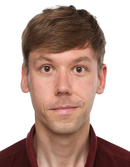Marcus Döller
marcus.doeller@uni-erfurt.deDoktorand (Max-Weber-Kolleg für kultur- und sozialwissenschaftliche Studien)
Sprechzeiten
nach Vereinbarung
Besucheranschrift
Max-Weber-Kolleg für kultur- und sozialwissenschaftliche Studien
Campus
Nordhäuser Str. 63
99089 Erfurt
Postanschrift
Universität Erfurt
Max-Weber-Kolleg für kultur- und sozialwissenschaftliche Studien
Postfach 90 02 21
99105 Erfurt

Zur Person
Curriculum Vitae
- seit Okt 2018 Doktorand an der IGS "Resonant Self-World Relations in Ancient and Modern Socio-Religious Practices", Max-Weber-Kolleg der Universität Erfurt
- 2017 Magister Philosophie
- 2016 BA Germanistik
- Seit April 2017 wissenschaftliche Hilfskraft am Lehrstuhl für Praktische Philosophie mit besonderer Berücksichtigung der Rechtsphilosophie bei Prof. Dr. Christoph Menke am Exzellenzcluster „Herausbildung Normativer Ordnungen“ in Frankfurt am Main
- Von 2015-2018 gemeinsam mit Sebastián Tobón Organisator des Internationalen Arbeitskreises für Kritische Theorie am Institut für Sozialforschung in Frankfurt am Main
- Von 2015-2017 studentische Hilfskraft am Lehrstuhl für Praktische Philosophie mit besonderer Berücksichtigung der Rechtsphilosophie bei Prof. Dr. Christoph Menke am Exzellenzcluster „Herausbildung Normativer Ordnungen“ in Frankfurt am Main
- Von 2012-2015 Arbeit als Hilfskraft im Rahmen der Einführung in die Philosophie als Tutor bei Prof. Dr. Martin Seel
- 2011 Arbeit als Hilfskraft im Rahmen der Einführung in die Praktische Philosophie als Tutor bei Prof. Dr. Christoph Menke
Forschungsprojekt
In the project »Autonomy as Social Practice« I want to explain the internal relation between subjective autonomy and institutional practices. The claim is that autonomy of subjects can only realise itself through participation in social practices and institutional contexts. In this approach I want to compare current theories of normativity one the one side and theories of social critique on the other side. Theories of normativity try to analyse necessary conditions in linguistic practices characterised as rule following through an internalisation of linguistic rules as constitutive for processes of giving and asking for reasons in intersubjective forms of rational legitimation for social action. Theories of social critique try to describe internal contradictions in constitutive social spheres for the reproduction of the social. Both theories explain an internal connection between autonomy and social practices but both understand the status of this connection differently. They manage the explanation of the status differently because theories of normativity try to explain the constitutive normative elements from an abstract level. This abstract level can be the explanation of constitutive linguistic rules or context transcendent normative standards of universalistion and reciprocal justification of constitutive norms. Whereas theories of social critique reconstruct constitutive social norms from an internal point of view of the social actors and the social spheres in institutional settings itself. In a second step they show that there is a contradiction between the articulated norms and the realisation of these norms within the institutional reality.
I want to show that Hegels Theory of objective spirit can give a further going explanation because with Hegels theory of social practices and institutions we can explain that norms constitutive for social institutions are internally resistant to change and reason even if they are a product of reason because they have the structure of second nature. To understand norms in its structure of second nature means that norms are immediate because they are not in the horizon of the awareness of social actors but rather implicitly articulated within the habitus and the bodily interactions of them. There is a prereflexive normativity incorporated in the body which is produced by reason but at the same time resistant to rational justification and normative interpretation. To interpret this prereflexive normativity in a proper way we have to make the constitutive elements within the understanding of participants on this practice explicit in a broader framework of what Charles Taylor calls constitutive theories of language. This framework allows us to change the language in its structure from within. In this transformation within language we can reinterpret the implicit commitments and understandings of ourselves which are realised in our bodily behaviour. My research project aims to give this constitutive interpretation of language a normative twist. Because it will show that the realisation of subjective autonomy is constitutive connected to participation in social practices in which autonomy can realise itself. But in this realisation in modern forms of social institutions it produces at the same time forms of heteronomy internal linked to the realisation because of the inherent contradictions between the economical and the political sphere. The project is going to elaborate these contradictions with regard to the structure of autonomy in modern societies. The context of the Max Weber Center allows me to conceptualise the constitutive conditions for subjective autonomy as necessary for resonant self-world-relations. Because autonomy is at the same time the normative presupposition and social effect for successful forms of self-transformation within the participation on social practices in its basic structure.
Publikationen
- Das artistische Potential der Popkultur. In: Thomas Hecken und Marcel Wrzesinski (Hg.), Philosophie und Popkultur. Bochum 2010, S. 143-157.
- Formen der Intersubjektivierung moralischen Urteilens. In: Juventas Zeitschrift für junge Philosophie. Heft 1. Bonn 2011.
- Kunst als Widerspruch gegen die Widersprüche. In: Martin Vialon u.a. (Hg.), Kritik und Versöhnung – Beiträge zu einem Kongress an der Carl von Ossietzky Universität Oldenburg. Oldenburg 2016.
- Das Tier und der Souverän. Figurationen des Politischen in Jacques Derridas letzten Seminaren. Widerspruch 62– Münchner Zeitschrift für Philosophie. 2016, S. 164-167.
- Dos formas de la crítica. In: Gianfranco Casuso und Justo Serrano Zamoa (Hg.), Las Armas de la Crítica. Barcelona 2018, 117-140.
- DEMOCRACIA EN CRISIS UN DIÁLOGO CON REGINA KREIDE. In: Gianfranco Casuso und Just Serrano Zamoa. (Hg.) Las Armas de la Crítica. Barcelona 2018, 418-445.
- Das Schweigen der Sprache – Ein Versuch über die Philosophie des Films. In: Alexander Fischer (Hg.), Grenzgänge in der Philosophie: Denken darstellen. Tagungsband mit Zeichnungen von Sebastian Lörscher. Münster: Mentis Verlag 2017.
- The Musical Work. Form the being to the nothing and the interruption of the void. Cover Text Jonas Kasper Jensen 2018.

